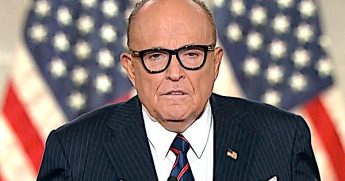
Attorneys for Rudy Giuliani say a covert warrant that prosecutors obtained for his Apple iCloud account in November 2019 and a raid last month by agents who seized his electronic devices show they are treating him more like a drug kingpin or terrorist than a personal lawyer to former President Donald Trump.
In a letter to a federal judge in Manhattan, the lawyers said that by secretly seizing Giuliani’s cloud data files in 2019, investigators had improperly intruded on private communications with the president.
The seized files, they wrote, likely included “material relating to the impending impeachment, the welfare of the country, and to national security.”
They asked the judge to unseal affidavits in support of the Nov. 4, 2019, search warrant. Reviewing the affidavits, the lawyers said, will help them expand their argument “that this unilateral, secret review was illegal” and that any evidence gathered from it should be suppressed.
The letter was sent to a Manhattan federal judge who is considering whether to appoint a “special master” to protect attorney-client privilege during a review of evidence gathered from raids on Giuliani’s residence and office in April.
It was initially sent last week. A redacted version was made public Monday.
A spokesperson for prosecutors declined comment.
Federal prosecutors in New York are examining Giuliani’s interactions with Ukrainian figures and whether he violated a federal law that governs lobbying on behalf of foreign countries or entities without registering with the U.S. government.
Any warrant issued in 2019 as part of that inquiry, or any other investigation, would have been approved by a neutral judge.
Giuliani, a Republican and former New York City mayor who represented Trump in the special counsel’s Russia investigation, has not been charged with a crime.
He has said his activities in Ukraine were conducted on behalf of Trump. At the time, Giuliani was leading a campaign to press Ukraine for an investigation into Joe Biden and his son Hunter before the Democrat was elected president.
Some Ukrainians who dealt with Giuliani as he campaigned against the Bidens were also looking for his help with matters of their own, including arranging meetings with U.S. officials or pressuring the Trump administration to oust the U.S. ambassador to Ukraine.
Giuliani’s lawyers have argued that the early morning April raids on his home and office were not necessary because he had made clear in 2019 that he would answer any questions without restrictions, except for privileged matters, as long as his lawyers knew what subjects would be discussed.
They said prosecutors instead “simply chose to treat a distinguished lawyer as if he was the head of a drug cartel or a terrorist, in order to create maximum prejudicial coverage of both Giuliani, and his most well known client – the former President of the United States.”
In addition, the lawyers wrote, the original warrant for Giuliani’s iCloud account contained a non-disclosure order based on an allegation made to a judge that Giuliani might destroy evidence or intimidate witnesses if he knew the warrant existed.
“Such an allegation, on its face, strains credulity. It is not only false, but extremely damaging to Giuliani’s reputation. It is not supported by any credible facts and is contradicted by Giuliani’s efforts to provide information to the Government. We should be allowed to question the Government as to what basis it had, if any, to make that assertion,” they said.
Giuliani attorney Robert Costello said prosecutors have another week to respond to the letter.
In a separate letter dated last week but filed publicly Monday, lawyers for Victoria Toensing — a Washington lawyer whose phone was seized last month as part of the same investigation — asked a judge to order the Justice Department to return her cell phone as well as information collected from her iCloud and Google accounts from what they described as “covert warrants” in 2019.
Given the breadth of the warrants, the lawyers wrote, “it is virtually certain that the materials the Government received included substantial privileged and confidential information concerning clients and criminal matters that have nothing to do with this investigation, privileged and confidential information concerning unrelated other matters that are actively before the DOJ, and privileged and confidential information that is the subject of the warrants.”
The defense lawyers said the government has so far declined to reveal what materials a specialized filter team has acquired, reviewed or turned over to the investigative team.
Via AP


